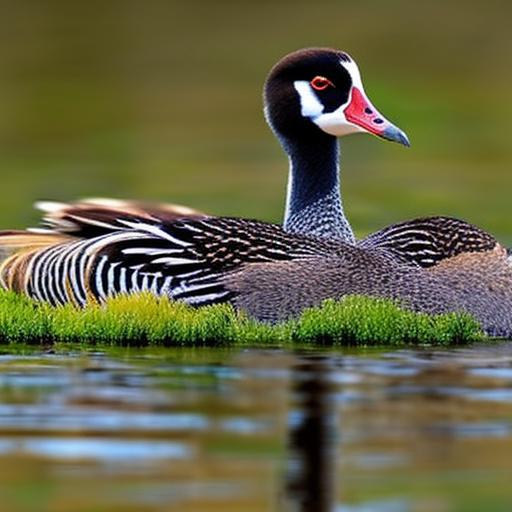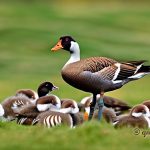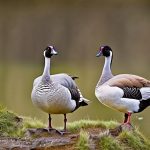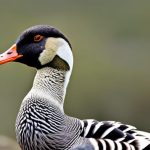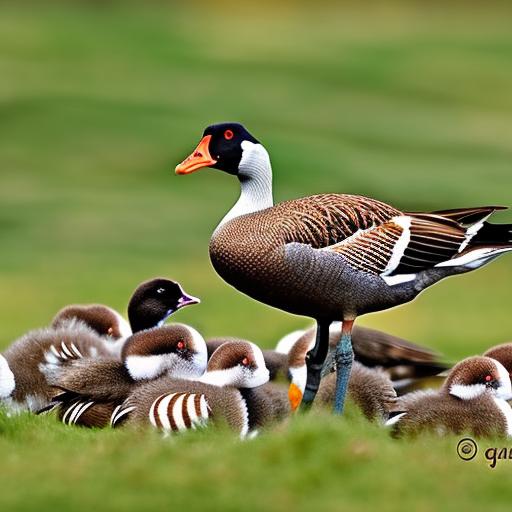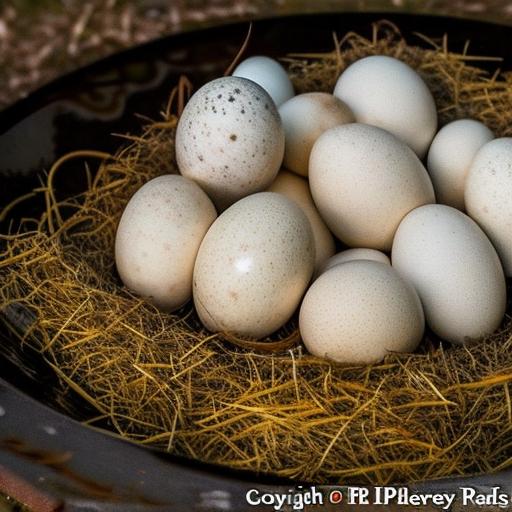African geese breeding has a long and rich history, dating back thousands of years. These geese are native to Africa and were first domesticated by ancient Egyptians. They were highly valued for their meat, eggs, and feathers. Today, African geese are popular among breeders for their unique characteristics and adaptability.
One of the reasons why African geese are popular among breeders is their size. They are one of the largest breeds of geese, with males weighing up to 20 pounds and females weighing up to 18 pounds. This makes them an excellent choice for those looking to raise geese for meat production. Additionally, African geese are known for their calm and docile temperament, making them easy to handle and work with.
Key Takeaways
- African geese are a popular breed for their meat, eggs, and ornamental value.
- African geese are known for their docile temperament, hardiness, and adaptability to different environments.
- When selecting breeding stock, look for healthy birds with good conformation and temperament.
- Adequate housing and environment are important for successful breeding and raising of African geese.
- African geese have a long breeding season and can lay up to 50 eggs per year.
Characteristics and Behavior of African Geese
African geese have distinct physical characteristics that set them apart from other breeds. They have a long, slender neck and a large, round body. Their feathers are typically gray or white, with some individuals having black markings on their wings and back. African geese also have a prominent knob on their forehead, which is more pronounced in males.
In terms of behavior, African geese are known for being social animals that thrive in groups. They are highly adaptable and can tolerate a wide range of climates, making them suitable for breeding in various regions. African geese are also excellent foragers and can graze on grasses and other vegetation to supplement their diet.
To identify male and female African geese, you can look at their physical characteristics. Males tend to be larger in size and have a more pronounced knob on their forehead. They also have a deeper honk compared to females. Females, on the other hand, are slightly smaller and have a less prominent knob.
Selecting Breeding Stock for African Geese
When selecting breeding stock for African geese, there are several factors to consider. First and foremost, you want to choose healthy birds that are free from any genetic defects or diseases. Look for birds that have good body conformation and are free from any physical abnormalities.
It is also important to choose birds that come from good genetic stock. This means selecting birds that have a strong lineage and come from reputable breeders. This will help ensure that the offspring will have desirable traits and characteristics.
You can find good breeding stock for African geese through various sources. One option is to attend poultry shows and exhibitions, where you can see a wide variety of geese breeds on display. Another option is to contact local breeders or join online forums and groups dedicated to geese breeding. These platforms can provide valuable information and connections to reputable breeders.
Housing and Environment for Breeding African Geese
Proper housing and environment are crucial for successful breeding of African geese. They require a spacious and secure enclosure that provides protection from predators and the elements. The enclosure should have a sheltered area where the geese can seek refuge during extreme weather conditions.
The ideal environment for breeding African geese is one that mimics their natural habitat. They prefer open spaces with access to water, as they are excellent swimmers. If possible, provide a pond or pool for the geese to swim in, as this is not only enjoyable for them but also helps keep their feathers clean.
Maintaining a clean and healthy living space for African geese is essential for their overall well-being. Regularly clean the enclosure, removing any droppings or debris. Provide fresh bedding material, such as straw or wood shavings, to keep the area clean and comfortable for the geese.
Breeding Season and Reproduction of African Geese
The breeding season for African geese typically begins in late winter or early spring, when the days start to get longer. During this time, the geese become more active and start to display courtship behaviors. Males will often chase and honk at females, while females will respond by bobbing their heads and making soft calls.
To encourage breeding in African geese, it is important to provide them with a suitable nesting area. This can be a simple nest box or a secluded area with soft bedding material. The female will lay a clutch of eggs, usually around 6 to 12, and will incubate them for about 28 to 35 days.
The mating process of African geese is quite fascinating. The male will mount the female from behind and hold onto her neck with his bill. This position, known as “cloacal kiss,” allows for the transfer of sperm from the male to the female. After mating, the female will lay her eggs and begin the incubation process.
Incubation and Hatching of African Geese Eggs
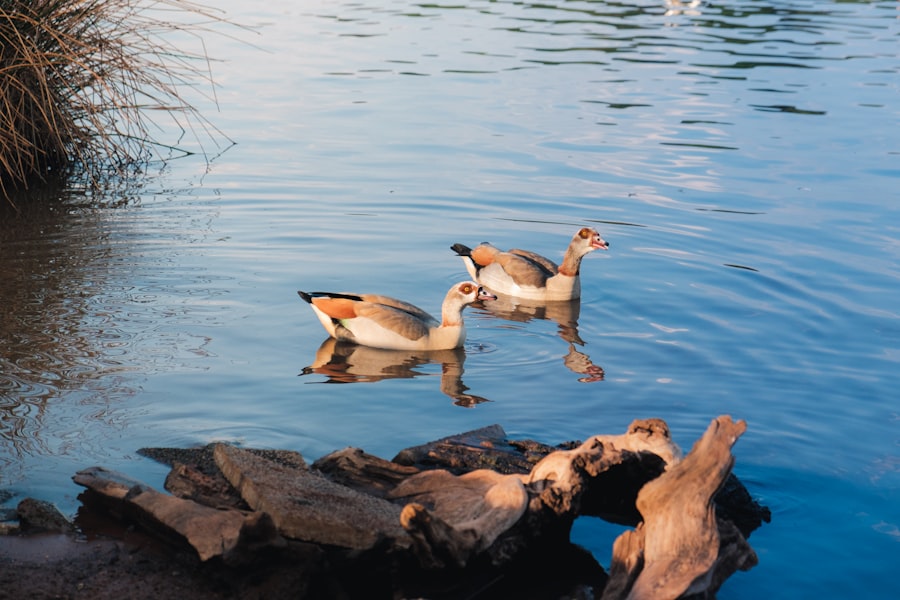
Incubating African geese eggs can be done using an incubator or by allowing the female to naturally incubate them. If using an incubator, set the temperature to around 99.5 degrees Fahrenheit and maintain a humidity level of around 55 to 60 percent. Turn the eggs at least three times a day to ensure proper development.
If allowing the female to incubate the eggs, provide her with a quiet and secluded area where she can nest undisturbed. Make sure the nesting area is clean and comfortable, with plenty of soft bedding material. The female will diligently sit on the eggs, turning them occasionally to ensure even heat distribution.
Successful hatching of African geese eggs requires patience and careful monitoring. The eggs will typically hatch after about 28 to 35 days of incubation. Once the eggs start to pip, which is when the goslings start to break through the shell, it is important not to disturb the process. Allow the goslings to hatch naturally and avoid handling them until they are fully dry and active.
Care and Feeding of Young African Geese
Caring for young African geese is crucial for their growth and development. Provide them with a warm and secure brooder area, equipped with a heat lamp to maintain a temperature of around 90 to 95 degrees Fahrenheit. The brooder should also have clean bedding material, such as straw or wood shavings, to keep the goslings comfortable.
Feeding requirements for young African geese include a balanced diet that provides essential nutrients for growth. Start with a high-quality starter feed that is specifically formulated for waterfowl. This feed should have a protein content of around 20 to 24 percent to support healthy growth.
It is also important to provide fresh water at all times. Use shallow dishes or waterers that are easily accessible for the goslings. Make sure to clean and refill the water regularly to prevent contamination.
Common health issues in young African geese include respiratory infections, parasites, and nutritional deficiencies. Monitor the goslings closely for any signs of illness, such as coughing, sneezing, or lethargy. If you notice any abnormalities, consult a veterinarian who specializes in poultry health.
Health and Disease Management in Breeding African Geese
Maintaining good health in breeding African geese is essential for their overall well-being and productivity. Common health issues in African geese include respiratory infections, parasites, and nutritional deficiencies.
To prevent diseases in African geese, it is important to practice good biosecurity measures. This includes keeping the housing area clean and free from droppings, providing clean water and feed, and regularly monitoring the geese for any signs of illness.
If you suspect that your African geese are sick, it is important to seek veterinary care as soon as possible. A veterinarian who specializes in poultry health can provide a proper diagnosis and recommend appropriate treatment options.
Regularly deworming the geese and providing them with a balanced diet can help prevent nutritional deficiencies and parasite infestations. Consult with a veterinarian or poultry nutritionist to develop a feeding program that meets the specific needs of your African geese.
Tips for Successful African Geese Breeding
To ensure successful breeding of African geese, there are several best practices to follow. First and foremost, provide a suitable environment that meets the needs of the geese. This includes providing ample space, access to water, and a clean and comfortable living area.
It is also important to select healthy and genetically sound breeding stock. Choose birds that come from reputable breeders and have good body conformation. Avoid birds that have any physical abnormalities or signs of illness.
When breeding African geese, it is important to be patient and allow the natural mating and incubation process to take place. Avoid interfering with the geese unless necessary, as this can disrupt their natural behaviors and instincts.
Breeding African Geese for Profit and Sustainability
Breeding African geese can be a profitable venture if done correctly. There is a growing demand for high-quality goose meat and eggs, making it a potentially lucrative market. Additionally, African geese are known for their adaptability and resilience, making them a sustainable choice for breeding.
To make a profit from breeding African geese, it is important to have a solid business plan in place. This includes identifying your target market, understanding their needs and preferences, and developing a marketing strategy to reach them.
Sustainable breeding practices for African geese include selecting breeding stock that is genetically diverse and free from any genetic defects or diseases. This helps ensure the long-term viability of the breed and prevents inbreeding.
The future of African geese breeding looks promising, as more people become interested in sustainable and locally sourced food options. By breeding African geese responsibly and ethically, breeders can contribute to the preservation of this unique breed while also meeting the demands of the market.
In conclusion, African geese breeding has a long and rich history, dating back thousands of years. These geese are popular among breeders for their unique characteristics and adaptability. When selecting breeding stock, it is important to choose healthy birds that come from good genetic stock. Providing a suitable housing and environment is crucial for successful breeding, as is understanding the breeding season and reproductive behaviors of African geese. Proper care and feeding of young geese, as well as maintaining good health and disease management, are essential for their overall well-being. By following best practices and adopting sustainable breeding practices, breeders can make a profit from breeding African geese while also contributing to the preservation of this unique breed.
If you’re interested in breeding African geese, you may also want to check out this informative article on Poultry Wizard about the different types of chicken coops. One of the articles, “Hannah Montana Chicken Coop,” provides insights into creating a stylish and functional coop for your feathered friends. Another article, “Farmhouse Chicken Coop,” offers tips on designing a coop that blends seamlessly with your rustic farmhouse aesthetic. Additionally, if you’re curious about the incubation period for chicken eggs, Poultry Wizard has an article titled “How Long for Chicken Eggs to Hatch Naturally?” that delves into the fascinating process of natural egg hatching.
FAQs
What are African geese?
African geese are a domesticated breed of geese that originated in Africa. They are known for their large size, distinctive knob on their beak, and their ability to lay a large number of eggs.
What is the breeding process for African geese?
Breeding African geese involves selecting a male and female goose and allowing them to mate naturally. The female will lay eggs, which can be incubated or left for the female to hatch. It is important to ensure that the geese have access to a suitable nesting area and are provided with proper nutrition.
What is the incubation period for African geese eggs?
The incubation period for African geese eggs is approximately 28-34 days. During this time, the eggs must be kept at a consistent temperature and humidity level to ensure proper development.
What is the average clutch size for African geese?
The average clutch size for African geese is around 8-12 eggs. However, some geese may lay more or fewer eggs depending on various factors such as age, health, and nutrition.
What is the lifespan of African geese?
African geese can live for up to 20 years in captivity if provided with proper care and nutrition.
What are some common health issues that African geese may face?
Some common health issues that African geese may face include respiratory infections, parasites, and injuries from predators or other geese. It is important to provide regular veterinary care and maintain a clean and safe living environment to prevent these issues.
Meet Walter, the feathered-friend fanatic of Florida! Nestled in the sunshine state, Walter struts through life with his feathered companions, clucking his way to happiness. With a coop that’s fancier than a five-star hotel, he’s the Don Juan of the chicken world. When he’s not teaching his hens to do the cha-cha, you’ll find him in a heated debate with his prized rooster, Sir Clucks-a-Lot. Walter’s poultry passion is no yolk; he’s the sunny-side-up guy you never knew you needed in your flock of friends!

